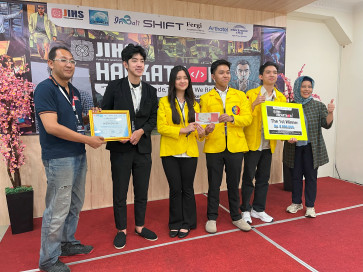Social media and PR tasks
"Social media" is the term commonly given to websites, online tools and other Interactive Communication Technologies (ICT) which allow users to interact with each other in some way - by sharing information, opinions, knowledge and interests
Change text size
Gift Premium Articles
to Anyone

"Social media" is the term commonly given to websites, online tools and other Interactive Communication Technologies (ICT) which allow users to interact with each other in some way - by sharing information, opinions, knowledge and interests.
As the name implies, social media involves the building of communities or networks, encouraging participation and engagement.
Blogs are perhaps the most well-known example of social media, but the term encompasses other platforms. Examples include podcasts, "wikis", message boards, social book-marking websites, social networking websites and content-sharing websites.
Social media can be referenced in a variety of ways, often depending on which sector is discussing it. Other terms which may be used in a similar context include "social software", "social computing" and "Web 2.0". For convenience we will use "social media" throughout.
The growing popularity of social media has attracted the attention of companies in Asia including Indonesia, who believe that these platforms open up new opportunities for communication. The opportunities are indeed there, as are the pitfalls.
Organizations that apply the usual methods of dealing with the media can get into deep trouble, but that doesn't mean that the "rule book" can be completely disregarded. There are areas - both legally and in terms of best practice - that is still applicable whether dealing online or offline.
Public relations practitioners in Indonesia have a particular duty in this area - and indeed an opportunity to set standards. In general, it should err on the side of disclosure, even where there might not seem an overriding professional obligation to do so.
For example, it is recommend that running a personal blog, whether or not it deals with public relations-related issues, should normally state on it the nature of their employment. When posting a comment on another blog it may also be advisable to state that you work in the public relations profession.
Equally, public relations practitioners should know that reputation is holistic - it is not possible to sustain one image created through conventional media alongside a completely different one created through social media. Old and new media should bear that interaction in mind. Reputation is one continuum. Social media presents many traps in this regard.
A growing number of organizations in Indonesia are incorporating social media into their communications. As a relatively new phenomenon, this is still, in legal terms, a developing area. While the medium may be different, however, many of the legal considerations associated with print and broadcast need to be borne in mind.
There is much debate over the use of social media, and there is, as yet, no definitive answer. Organizations will always want to protect their brand against misuse or misrepresentation and also bear a certain amount of legal responsibility for any action that could harm their reputation. Being aware of the potential issues as an organization means that steps can be taken to ensure these issues do not materialize.
Social media makes it easier for PR practitioners to connect with journalists outside of a static media database. It will be more accessible than ever to what journalists are working on, what the preferences are, and how they like to work with PR people.
For PR practitioners who take the time to connect and build relationship with journalists through these new channels will find it easier to get attention when it is needed. It will also expand the media options, because they will no longer be limited to print, broadcasts and websites for media targeting.
Indonesian journalists are also learning how to better manage and process information. Journalists today are bloggers and have resorted to building complex email filters and PR blacklists; this means many of them may be more receptive to pitches again. Reputation-based systems or social networks that give journalists access to reliable information on a company, helps them respond faster to a company's PR requests.
It is just as important to measure the success of the organization's social media work against business objectives as it is in other PR activities. This helps the organization demonstrate the value of the organization's work, justify budgets and plan for the future.
Just like traditional media, there is no "silver bullet" or single method for evaluating social media, but there are a number of methods available. As with all campaigns, set out the objectives for the activity at the start and then measure the performance and success against them.
Effective social media sourcing and analysis are: Normalize the social media evaluation - remember, this is just another media type; do not do it in isolation - integrate it with your mainstream media analysis so you have the ability to view a complete and comparable media landscape which reflects the consumer's media experience and also the consumer's perspective, seeing mainstream and consumer-generated media side by side; and do not get obsessive about seeing and analyzing everything in the blogosphere - it is misleading and can send costs spiraling as "coverage" volumes build again.
The consumer's experience should be the yardstick. (Source: The International Association Measurement and Evaluation of Communication or AMEC).
There are no hard and fast rules for organizations wishing to use social media, and the landscape is constantly evolving. However, openness and transparency are key elements.
Organizations and individuals who do not respect this can find themselves criticized publicly for attempting to utilize these social media networks without disclosing full commercial intent - and this involvement can backfire spectacularly. You should abide by the rules and etiquette of the community in question.
There will generally be an area explaining how to use the website which will include policies and guidelines to help judge how to engage with other visitors to the site. If you can't find this information, make contact to find out what is and isn't acceptable - either via a named contact or a discussion forum.
This is an evolving area, with regular new developments and innovation.
The landscape changes constantly and the issues which seem most pressing today will most likely be replaced by new ones in the near future.
It is therefore worth bearing in mind that with the emergence of new forms of social media, there will be new challenges for Indonesian public relations practitioners.
Nico Wattimena PhD is a senior lecturer of the postgraduate program at the London School of Public Relations, Jakarta.









